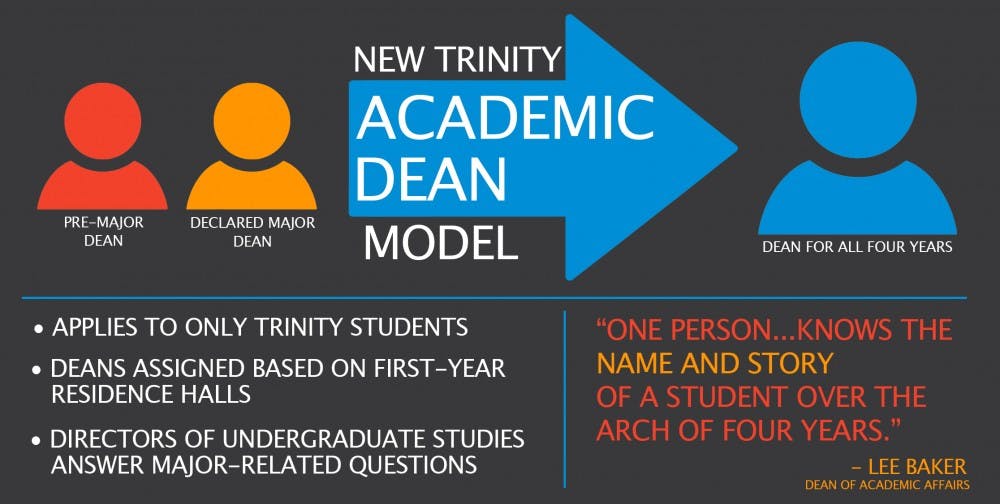Trinity students in the Class of 2019 will have the same academic dean for their entire time at Duke.
Duke’s dean model, revised before the beginning of the academic year, now assigns students in the Trinity College of Arts and Sciences to academic deans who will advise them throughout their four years as undergraduates. This structure—in which all students living in each first-year residence hall are advised by the same academic dean—will replace the old model that reassigned students’ academic deans when they declared their major during their fourth semester.
“We thought it would be important to have one person that knows the name and story of a student over the arch of four years,” said Lee Baker, dean of academic affairs for Trinity and associate vice provost for undergraduate education.
After a recommendation from the Academic Advising Task Force within Trinity that a four-year dean model would be more beneficial to students and the University, a committee of four Trinity deans—Associate Dean Donna Kostyu, Assistant Dean Alyssa Perz-Edwards, Associate Dean Sabrina Thomas and Senior Associate Dean Gerald Wilson—began considering the model.
Kostyu explained that the model was an attractive option because it allows students to form better connections with their deans.
“It meant that students could establish a relationship with a dean upon entering Duke, and wouldn’t have to change deans when they declared a major or changed a major,” she said.
Assigning deans based on first-year residence halls also establishes a model in which Housing Dining and Residence Life staff, faculty in residence, resident assistants and residence coordinators have the opportunity to form a close-knit community for incoming freshman, she noted.
In addition to the four Trinity deans who worked to implement the model, there are nine other academic deans. Three deans were appointed this year—licensed clinical psychologist John Blackshear, Shane Goodridge, visiting assistant professor of public policy, and Rachael Murphey-Brown, previously director of Academic Engagement for Global and Civic Opportunities—for a total of 13 academic deans. All deans have more than one specialization and some have as many as six.
Baker said he recognizes that with the new dean model, students may be assigned to deans that do not specialize in the major they eventually select. Their deans may not be able to answer specific questions about the major, research opportunities and applying to graduate schools.
This drawback concerned some students, including junior Harrison Ferlauto, who noted that the new system will lead to a “separation” between what the dean knows and what the student needs.
“It’s awful,” said sophomore Mohamad Chamas. “We need somebody to be knowledgeable about our majors. You need to change deans when you change interests.”
But with so many students double majoring, it was already becoming difficult to represent each student’s interests when reassigning academic deans during their fourth semester, Baker noted. He added that Directors of Undergraduate Studies will now be responsible for specific questions regarding majors.
“DUSs and staff may need to work with multiple deans,” Kostyu said. “As a result, the new model maintains liaisons between departments and deans.”
Baker explained that he saw the benefits of the new model firsthand when he addressed the parents of Trinity freshmen during orientation. Parents were relieved to hear that their children could turn to their academic deans throughout their four years at Duke, he said.
“When our deans were welcoming students and shaking hands with the parents, there was almost a palpable sign of relief,” Baker said. “[Their children are] not just being handed off after they’ve declared their majors.”
He also noted that having one consistent academic dean will particularly benefit students who go through multiple extenuating circumstances. Having a consistent academic dean will help them monitor the progress of their degree completion more efficiently.
“This way it’s like, ‘You’re back from studying abroad, I know you’ve got three semesters, I know you’ve had a rough patch, but we’re going to get you through,’” Baker said. “They’ve got someone who knows their history.”
However, some students may not have the same academic dean for four years. Because academic deans are not locked into four-year contracts, a student’s dean will change if the dean decides to leave.
Baker said he does not anticipate this happening often.
“When people sign on for being an academic dean as a new job, they’re mindful of it,” he said. “This isn’t just a place to get experience for a couple of years and then go off to another university. This is more of a longer term commitment and relationship.”
Claire Ballentine contributed reporting.
Get The Chronicle straight to your inbox
Signup for our weekly newsletter. Cancel at any time.

